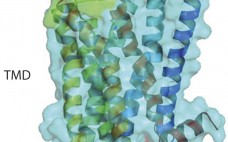with Francesc Gòdia (chemical engineering professor at the Universitat Autònoma de Barcelona) Chemically defined media free of animal-derived components are required for bioprocess operations based on mammalian cells. Supplementation of commercial media with specific compounds was studied using a design of experiments (DoE) approach to screen the most efficient compounds for two cell lines and then determine their optimal conditions. DoE allowed simultaneous testing of several compounds to determine potential interactions among them in addition to their individual effects. Gòdia’s…
Expression Platforms
A Novel Solid-Media E. coli Platform: Comparison with Standard Fermentation Processes
MicroProtein Technologies Inc. has developed the MPTxpress high-yield, low‑cost, recombinant Escherichia coli manufacturing platform. Rather than using liquid culture media within stirred bioreactors, the system uses trays filled with semisolid (gelled) culture media overlaid with or without a permeable membrane on which the E. coli is cultured. Compared with conventional liquid fermentation platforms, the MPTxpress system reduces the number of steps in up- and downstream processing and required infrastructure, significantly improves yields, and lowers costs. It provides simplicity for mixing…
Targeting G Protein–Coupled Receptors with Biologics for Therapeutic Use, Part 1
G -protein coupled receptors (GPCRs) represent a target superfamily linked to many disorders across all therapeutic areas. Although this target class has been historically treated by small molecules and peptides, antibodies can offer a number of advantages over such molecules by virtue of their specificity, dosing frequency, and restricted penetration. They also can provide other functional effects specifically mediated by the Fc region (ADCC and CDC) as well as different modalities such as those offered by bispecific and antibody drug…
Optimizing for the Future
The 2013 biennial meeting of the European Society for Animal Cell Technology (ESACT) was in Lille, France this past June. While there, BPI editorial advisor Miriam Monge (vice president of Biopharm Services Ltd.) interviewed ESACT executive committee member Hitto Kaufmann, PhD (vice president of biopharmaceutical process sciences for Boehringer Ingelheim). They talked about some scientific developments being discussed at this year’s ESACT conference as well as Boehringer Ingelheim’s recent announcement about setting up in China and Kaufmann’s own thoughts on…
Assay Acceptance Criteria for Multiwell-Plate–Based Biological Potency Assays
For most biopharmaceuticals, potency is assessed in a bioassay by comparing dose–response curves of the test material and a reference standard. As with all analytical techniques, such assays require criteria by which their execution can be judged objectively to be valid, regardless of whether the desired or expected result is obtained for the test sample. PRODUCT FOCUS: BIOLOGICSPROCESSFOCUS: R&D, QCWHO SHOULD READ: PRODUCT AND PROCESS DEVELOPMENT, ANALYTICAL, QCKEYWORDS: IMMUNOASSAYS, POTENCY ASSAYS, PRODUCT RELEASE, REFERENCE STANDARDS, CONTROL SAMPLES, SAMPLE ACCEPTANCELEVEL: ADVANCED…
Mathematical Model for Production of Recombinant Antibody 14D9 By Nicotiana tabacum Cell Suspension Batch Culture
Transgenic plants are increasingly considered a competing system for producing high-value recombinant proteins for biomedical and industrial purposes at affordable costs (1). Researchers have shown that molecular farming (or biopharming) is a secure technology that is capable of rendering valuable recombinant proteins free of toxins and animal pathogens in a relatively short time (2,3,4,5,6). Scientists have also demonstrated that most recombinant antibodies produced in plants maintain their functional properties (substantial bioequivalence) as well as do those produced in mammalian cell…
Design of Experiments for Fed-Batch Process Development in Shaken Cultures
When designing a recombinant protein production process, a high number of parallel cultivations must be carried out. That task is typically performed using batch cultures in shake flasks or microwell plates, in which fermentation conditions are not monitored. To overcome that limitation, we combined the SensorDish Reader and Shake Flask Reader systems (from PreSens) with an enzymatic glucose delivery system (EnBase technology from BioSilta Oy) for Escherichia coli cultivations. Our objective was to determine whether SensorDish reader cultures would yield…
Development of Protein Capsular Matrix Vaccine Platform Technology
Polysaccharide vaccines account for about 30% of the total >$20-billion/year vaccine market. Despite efficacious vaccines in the field, diseases such as invasive Streptococcus pneumoniae and typhoid fever persist. Development of multivalent polysaccharide conjugate vaccines requires complex chemistries and multiple, expensive good manufacturing practice (GMP) process steps. Matrivax Research and Development Corporation is developing a protein capsular matrix vaccine (PCMV) technology that simplifies synthesis of polysaccharide vaccines with fewer process steps than are required by typical conjugation vaccine processes. Polysaccharide Vaccine…
Concerns, Collaboration, and Capacity
The BPI Theater is a 50-seat venue that for seven years has been located at the heart of the BioProcess Zone on the exhibition floor of the BIO International Convention. There, BPI provides attendees with four days of live presentations focusing on the latest scientific advances and business trends in biotherapeutic development and manufacturing. On Monday afternoon, 22 April 2013, Patricia Seymour of BioProcess Technology Consultants (BPTC) moderated a roundtable discussion on biosimilar development in the BPI Theater at BIO…
Better Cells for Better Health
Since its inception 35 years ago, the biennial meeting of the European Society for Animal Cell Technology (ESACT) has built on a tradition of combining basic science and applications into industrial biotechnology to become the international reference event in its subject matter. Every other year, this gathering of academics and industry professionals features a famously exciting social program and an extensive vendor/supplier exhibition specific to animal cell technology. ESACT meetings are much-anticipated international venues for information exchange, inspiration, networking, and…



